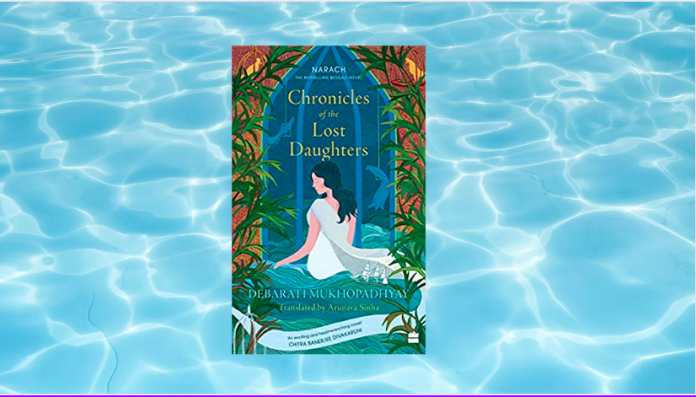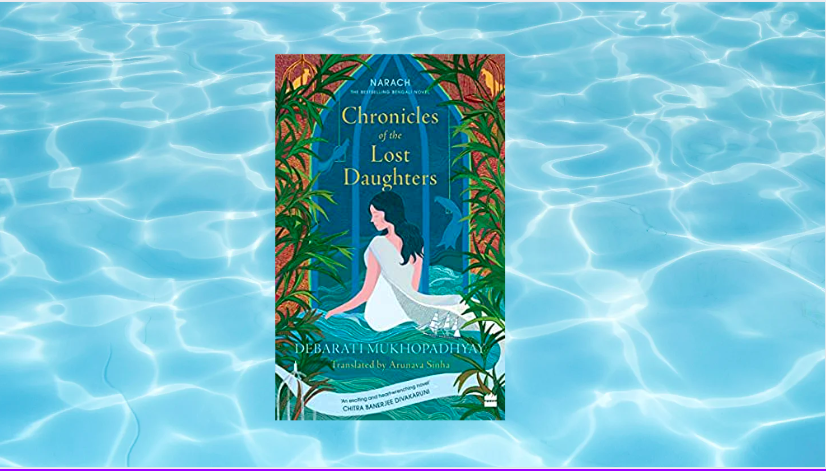Chronicles of the Lost Daughters
by Debarati Mukhopadhyay, translated by Arunava Sinha
Publsiher: Harper Collins India (2022)
Renowned author, civil servant, and an inspiration to many, Debarati Mukhopadhyay is famous for her 20+ novels simultaneously celebrating and examining Indian culture. Her latest, ‘Chronicles of the Lost Daughters’ is set in the pre-Independence era and describes the life and struggles of the Chattopadhyay family.
The book begins by talking in vivid detail about the current situation the protagonist, Krishnoshundor Chattopadhyay finds himself. His past, and how he got into the situation are set aside for the moment, highlighting that one’s origins or caste and community do not matter here. Everyone is treated with the same amount of disregard and inhumanity. It is with a certain despair that we read that this is only the beginning.
The writer captures the unique rituals and beliefs that form the foundation of society at the time. This is not to say that the people are cruel, just unused to any other way of doing things. It is possible that some of these practices may seem bizarre and extreme at first reading. However, we need to remind ourselves that milder or perhaps subtler forms of these beliefs still abound among us. Like the famed village named after a God changing its name to Mowshatt( meaning cow and water buffalo), this family too has fallen on hard times. And misfortune seldom comes alone.
A hopelessly long list of challenges descends on the family and we wonder how they would emerge from the shambles. At times when the history surrounding a particular event is explained, it is quite an overload of characters and information. There are notes given at the end but it is still a lot to grasp. Readers already familiar with the culture would perhaps find these passages easier to follow. But once we get past that, the riveting story reels us in. Tragedy after tragedy befalls the Krishnodhar family, primarily due to the cruel people surrounding them. The ones in power did not reach there by being merciful and considerate.
It is truly disheartening to see this family suffer due to no mistake of theirs. As is the case usually, several seemingly unrelated events such as the establishment of zoos and new laws have far-reaching consequences on the lives of the common people. The book often reminds us that the written law and reality are often significantly different. Issues of the misrepresentation of the Vedas and ancient texts as a tool for oppression and exploitation, child marriage, and the education of women are discussed in detail. Krishnoshundor keeps asking if good really triumphs over evil and we also find ourselves wondering the same.
Yet small glimmers of hope emerge in the few selfless people still found in the book. Bonds of loyalty, affection, and friendship spring up between the most unlikely of characters. A thoroughly traditional, sickly woman with very little exposure to the outer world meets a young, well-educated girl. Instead of wallowing in jealousy and bitterness, she grows to care for her like a daughter. People from different religions, castes, and communities become steadfast confidantes and supporters of each other when they couldn’t even imagine living in the same place under usual circumstances. At times the books reminded me of ‘A Thousand Splendid Suns in its themes of the impact of national tragedies on common people and the perseverance of its characters.
Yet this story is firmly steeped in Indian culture and history. It reminds us of a rather depressing truth – that no one is immune to the unpredictability of life. Though the book doesn’t promise happy endings all around, towards the end, many of the obstacles seem to be crossed over in a rush. The twist doesn’t have quite the impact it should have made but it was still unexpected. However, the success of this book lies in the way it makes us root for the most unexpected characters and ends up tugging at our heartstrings.






RELATED ARTICLESMORE FROM AUTHOR
Can’t
Minor Disturbances at Grand Life Apartments
The Wait: And Other Stories